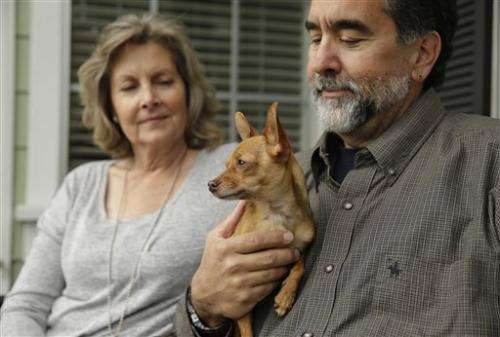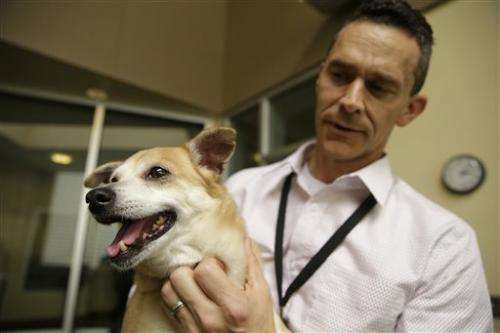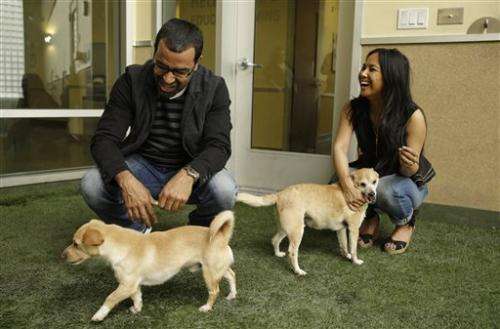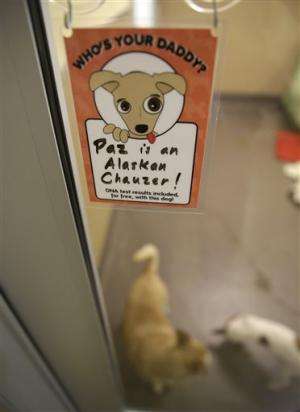DNA tests help California shelter speed up dog adoptions

A quarter of the dogs taken in by one California animal shelter look like Chihuahuas. So how do you make a pet stand out when it's similar to so many other dogs at the shelter? Check the DNA.
The Peninsula Humane Society and SPCA in Burlingame, a 30-minute drive south of San Francisco, began free DNA tests under the slogan "Who's Your Daddy?" Scott Delucchi, the shelter's senior vice president, came up with the idea to speed up adoptions of Chihuahua-centric dogs.
Because pets become part of the family, the $50 tests allow owners to find out the background of their pooches and certain traits they could exhibit. The tests also allow the shelter to get creative by coming up with clever breed names that can boost adoption odds.
For example, the Chihuahua-Australian shepherd-Jack Russell terrier-collie became a "Kiwi collier"; a Yorkshire terrier and beagle mix became a "Yorkle"; and a golden retriever-miniature pinscher-Chihuahua was proclaimed a "golden Chinscher."
In February, the shelter tested 12 lookalike dogs. One of the results was inconclusive, but 11 showed mutt combinations that the facility had never seen before. The tested dogs were all placed within two weeks—twice as fast as any 11 untested small, brown dogs in the previous months.
Twelve more dogs were tested, and once the last few in that group are placed, 24 more dogs will find out their breed backgrounds, Delucchi said.

In the two batches of tests, only 10 of 23 dogs had no Chihuahua in them. Chihuahuas took over from the glut of pit bull mixes that dominated the shelter until five or six years ago, Delucchi said.
There are a lot of reasons Chihuahuas became so popular, he said, citing Hollywood stars toting them in purses and the "Beverly Hills Chihuahua" movies.
Seeing one of the tiny dogs at the shelter changed Lynn Mazzola's mind about what kind of pet she wanted.
Mazzola of San Carlos, California, wanted a big dog, but 2-year-old, 6-pound Lily stole her heart. DNA results showed her that her new dog was part miniature pinscher, part Yorkie terrier and part Chihuahua, which the shelter dubbed a "Chorkie."
Knowing Lily's DNA gives you clues to her behavior, Mazzola said. For example, "it explains why she goes after birds and mice and she's not nervous like a Chihuahua," she said.
Mazzola's husband was about to undergo surgery and she wanted the dog to keep him company while he recovered.

After his operation, "he walked in the door, she ran up to him and hasn't been out of his lap since," Mazzola said of the dog that had been at the shelter for seven months.
The adoption promotion helped Lily, but it's going to take more than a gimmick to reduce the "alarming" number of Chihuahua mixes coming in, Delucchi said.
"Another part is making spay-neuter low-cost or free to the community," he said. "If you have a lot of one breed, you target that breed and those owners and make it easy for them to do the right thing and get them fixed."

He said facilities also work with states that need small dogs, such as Florida and New York, by flying in as many as they can handle.
Despite the promotion's tagline, the question that never gets answered is "Who's Your Daddy?" The DNA tests describe two parents, but they don't reveal which one is dad.

More information: www.peninsulahumanesociety.org
© 2015 The Associated Press. All rights reserved.

















